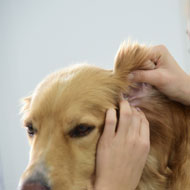Warning issued over eye exposure to ear drops

EMA said veterinary surgeons should advise pet owners to take care when applying Osurnia.
The European Medicines Agency has issued a warning about accidental exposure to Osurnia ear gel for dogs, after a number of pets and owners suffered eye injuries.
Injuries reported in people include two cases of corneal ulcers, as well as complaints of eye irritation, conjunctivitis, redness, during, stinging and itchiness. In dogs, there were reports of corneal ulcers, squinting, impaired vision, conjunctivitis, redness and swelling around the eye.
Eye exposure in humans largely occurred when the dog shook its head during or just after the medication was applied to the ear.
Veterinary professionals will be informed about this issue in writing and are being encouraged to report any suspected side effects to the relevant national authority, or the manufacturer of Osurnia, Elanco Europe Ltd.
EMA said veterinary surgeons should advise pet owners to take care when applying Osurnia, taking appropriate measures to ensure the product does not contact the eyes of people or dogs. This includes restraining the animal’s head while the medicine is applied.
If accidental exposure does occur, rinse the eyes thoroughly with water for 10-15 minutes and seek medical care.
Pet owners should also monitor dogs treated with the product and contact their vet if they notice any side effects, particularly those affecting the eyes.
EMA says it will continue to monitor the safety of the medicine and will take regulatory action as appropriate.



 The veterinary mental health charity Vetlife is inviting the veterinary community to join it for a sponsored cold-water dip.
The veterinary mental health charity Vetlife is inviting the veterinary community to join it for a sponsored cold-water dip.